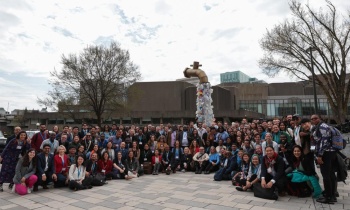QUNO Updates from INC-4 in Ottawa: Navigating Complexities Towards a Global Plastics Treaty

As the fourth session of the Intergovernmental Negotiating Committee (INC-4) to develop an international legally binding instrument (ILBI) on plastic pollution concluded in Ottawa, Canada, it highlighted significant contrasts in the negotiation dynamics. Despite the shared urgency to address global plastic pollution, diverging views on the approach and scope of the treaty underscored the session.
Challenges Encountered
The negotiations faced notable delays, with some countries employing tactics that appeared to stall progress, such as inserting brackets around contentious language, reflecting divergent ambitions and raising concerns about the collective commitment to a robust treaty. The extensive debates, including on terms like "polymer", and the slow progress in refining the treaty text into the early morning hours pointed to a challenging path ahead. The reluctance to include upstream measures such as the production of primary plastic polymers in the intersessional work—despite support from a cohort of 54 countries—was particularly disheartening. This omission suggests a compromise that could dilute the treaty’s potential effectiveness, as substantial initial ambitions were tempered in favour of securing any agreement instead of an optimal one.
Constructive Advances
Despite these challenges, there were significant advancements. The establishment of two intersessional expert groups marked a pivotal step forward. These groups will focus on financial mechanisms and criteria-based approaches for managing plastic pollution and its chemical constituents, setting foundational work for more in-depth negotiations at INC-5. Moreover, the spirited advocacy by the Pacific Small Island Developing States (SIDS) brought critical attention to the need for addressing the full lifecycle of plastics, particularly production, emphasising its exacerbation of the climate crisis.
The unveiling of the "Bridge to Busan" declaration by 28 countries was a strategic move to maintain high ambitions, specifically advocating for stringent control of plastic production. This collective declaration aims to steer the upcoming negotiations towards establishing a treaty that can effectively address the root causes of plastic pollution.
Outlook and QUNO’s Role
Looking forward, the path to INC-5 in Busan, South Korea, is fraught with challenges but also opportunities for meaningful engagement. The intersessional work, though not as comprehensive as hoped, provides a framework for continued advocacy and refinement of treaty provisions. QUNO has worked diligently with country representatives and civil society partners to emphasise the importance of addressing plastic subsidies within the treaty. Early discussions in Ottawa, including a strategic gathering led by QUNO, have built momentum around this critical issue, reflecting our ongoing commitment to influence the treaty negotiations positively.
As negotiations continue, QUNO remains dedicated to advocating for a treaty that is not only comprehensive but also robust enough to tackle one of the most pressing environmental issues of our time by tackling its root causes. We look forward to contributing to a treaty that genuinely reflects global ambition and the urgent need for systemic change in plastic production and consumption.
Relevant Attachments
Attached to this timeline post, you will find the opening and closing plenary statements delivered by QUNO on behalf of the Friends World Committee for Consultation (FWCC). Additionally, we are including an important Information Sheet titled "Eliminate Environmentally Harmful Subsidies for Primary Plastic Polymer Production in the Global Plastics Treaty."
This Information Sheet is a collaborative effort among QUNO, the Center for International Environmental Law (CIEL), the International Union for the Conservation of Nature (IUCN), and Fredric Bauer from Lund University. It aims to furnish negotiators and stakeholders with crucial data and steps needed to eliminate subsidies that significantly contribute to primary plastic polymer production, exacerbating plastic pollution. The document elaborates on the substantial subsidies that support the excessive production and consumption of plastic products, highlighting the urgent need for their elimination to mitigate environmental and health impact.


